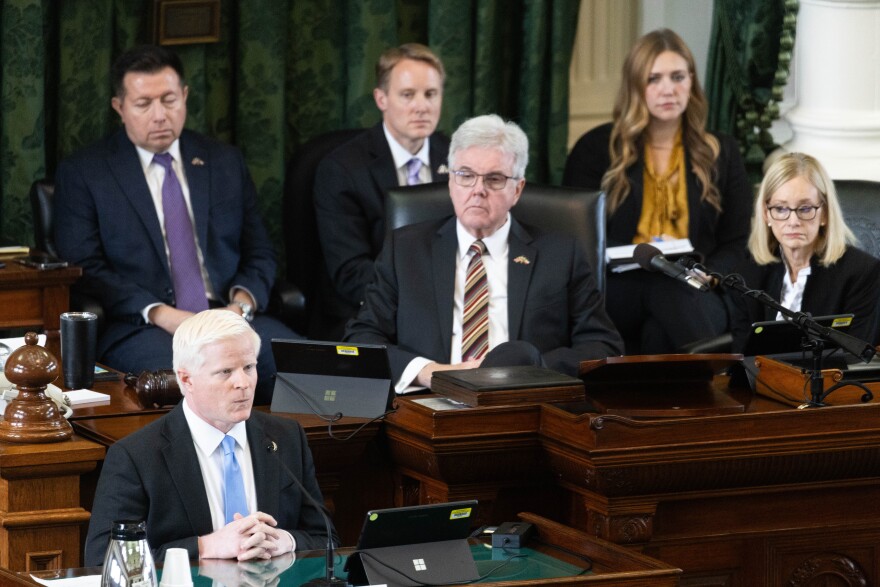With just days left in the impeachment trial of Ken Paxton, it’s now the defense’s turn to call witnesses to try to exonerate the suspended attorney general.
Trial onlookers were still reeling from a chaotic day in court Wednesday, when House prosecutors unexpectedly rested their case, and the woman Paxton allegedly had an extramarital affair with was expected to testify. Laura Olson was eventually deemed not eligible to testify and never took the stand.
Paxton has been suspended from office since May when the Texas House voted overwhelmingly to impeach the three-term Republican. Paxton is charged with bribery and abuse of office, among other infractions, and remains suspended pending the trial’s outcome.
Texas state senators — minus Paxton’s wife, Sen. Angela Paxton — are serving as jury in the impeachment trial. A two-thirds majority, or 21, would need to vote against Paxton for him to be removed from office.
Each side was allotted 24 hours to present their cases. As of Thursday morning, House impeachment managers had roughly two and a half hours left, while the defense team had about 8 hours and 40 minutes on the clock. Both sides have also been granted additional time for closing arguments, so the jury could be tasked with deciding Paxton’s fate by Friday.
Two of the articles of impeachment against Paxton involve allegations that he misused his office to aid Austin real estate developer Nate Paul in obtaining open records related to law enforcement searches on his properties (Paul, a Paxton campaign donor, is at the center of the impeachment).
The defense’s first witness, Justin Gordon, the open records division chief in the Texas Attorney General’s Office, seemingly disputed the charges that Paxton acted improperly when he forced the open records to be released. Under cross examination, Gordon said that his office’s original draft ruling was not to release the files in response to the open records request from Paul’s lawyer. Gordon’s office ultimately reversed its decision and released the files. Gordon testified that he spoke with Paxton about the records, but he demurred when asked if Paxton had pressured him to reverse his decision.
“I would not classify it as pressure,” he said.

The defense team successfully objected to much of the House’s cross examination, including details about the AG’s office report, which cleared Paxton of improperly terminating the whistleblowers. The defense’s second witness, Austin Kinghorn, associate deputy attorney general for legal counsel in the Texas Attorney General’s office, disputed much of the prosecution’s characterizations of his work on behalf of Paxton.
Prosecutor Erin Epley did draw out an admission from Kinghorn that he saw no legal difference between the interests of Paxton as attorney general and the State of Texas.
"If you had to choose between the State of Texas' interests and the Attorney General's interests, whom do you choose?" asked Epley.
"I don't see those as being in conflict with one another," responded Kinghorn.


